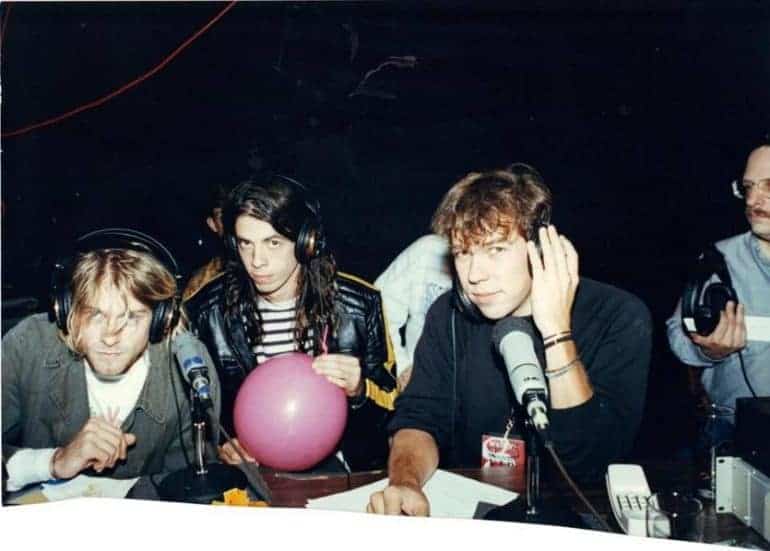Of all the dark songs by the band Nirvana, “Polly” is probably the most disturbing of them all. The sixth track from their 1991 second studio album Nevermind, “Polly” is a somber and acoustic song about the rape and torture of a teenage girl told from the perspective of the rapist.
Who Was Polly?
The song “Polly” was inspired by the true story of a kidnapping of a 14 -year-old girl who was abducted after a rock concert outside the Tacoma Dome in Washington in 1987. The kidnapper, Gerald Friend, was paroled in 1980 after being jailed for a similar conviction in 1960.
Gerald Friend, took the young girl back to his home, where he raped her repeatedly and tortured her with a blowtorch whilst being suspended from the ceiling. The girl, “Polly,” managed to escape and Friend was later arrested and jailed for life.
Kurt Cobain wrote the song after reading about the incident in the newspaper. Cruelties like those detailed in “Polly” are so heart-rending that the normal human instinct is to turn away. The truth is normally repressed and avoided in the mainstream, however, Kurt couldn’t bear that.
In addition to exploring his own fears and anxieties in Nirvana’s music, he was also a vocal feminist who repeatedly spoke out against sexism and violence against women, especially sexual violence.
In a 1991 interview with NME, Kurt is asked about having such a gruesome song on their hugely successful mainstream album Nevermind.
“Rape is one of the most terrible crimes on earth. And it happens every few minutes,” Kurt says. “The problem with groups who deal with rape is that they try to educate women about how to defend themselves. What really needs to be done is teaching men not to rape. Go to the source and start there.”
He continues, “I was talking to a friend of mine who went to a rape crisis center where women are taught judo and karate. She looked out the window and saw a football pitch full of boys, and thought those are the people that should really be in this class.”
In 1993, Nirvana played a benefit concert for Bosnian rape victims, raising $60,000 for the Tresnjevka Women’s Group. Also, in the liner notes to the compilation album Incesticide, Cobain told sexists not to buy Nirvana albums or come to the shows in an attempt to put morals before money.
Although Cobain’s views were deeply rooted in politics, his true genius was as an artist. As an artist, you can impact people much differently to what an activist or a politician can do.
Art, especially music, impacts us emotionally. It strikes at the core, and as a result, has a unique power to expand our empathy, which is why the perspectives of “Polly” are so horrifying.
What tuning is “Polly” by Nirvana?
“Polly” is composed in the key of E minor and Cobain’s vocals range from a low of D3 to a high of E4. The chord progression is just the same: E minor, G, D, C for the verses. Then G5, B flat 5, D5, E5 for the choruses.
In the chorus, an unobtrusive bass enters on the low end and Cobain adds a vocal harmony on a high end. There are no drums in the entire song except for one cymbal crash at the start of each chorus. There’s also a bass break after the second chorus that lasts 9 seconds before the repetitive sequence starts up again.
“Polly” is essentially Cobain and his guitar. A gentle, catchy melody and vocal. Although many Nirvana songs are catchy and simple, “Polly” takes this to a whole new level. The effect of this restraint is a feeling of closeness, intimacy, and authenticity.
The feeling is lifted even further by the simplistic equipment used. In an interview with Guitar World in 1992, he discusses the guitar he used. “That’s a 20-dollar junk shop Stella—I didn’t bother changing the strings. [laughs] It barely stays in tune. In fact, I have to use duct tape to hold the tuning keys in place.”
Embed from Getty ImagesThe flat plucky sound removes any polish that could mediate between, and ultimately, divide musician and listener. “Polly” is a song designed, in other words, to give Cobain access inside your head.
Legacy
The surprising and profound choice Cobain makes in “Polly” is to make the protagonist of the song the rapist. This is fairly clear from the first two lines of the song. “Polly wants a cracker… I think I should get off her first.”
Immediately, we are taken inside the mind of this vile man, carried along in the stream of his consciousness. Each verse reports what’s happening with an amused detachment, which is somehow scarier for its lack of emotion.
Kurt Cobain routinely downplayed the importance of his lyrics, but this is often not the case. While it may be wrong to look for hidden meanings, his journals reveal a fascination with language and wordplay.
The chorus of “Polly” is made up of fragments of images and sentiments that simulate perfectly the chaotic flux of thinking. The lyrics depict desires, regrets, cries for help, cruelty, self-deception, and righteousness.
In a way that only music can, Cobain forces an emotional identification with evil, to stop us from suppressing this brutality and exposing it into the mainstream making it unavoidable.
Although the song is deeply distressing, Kurt aims to dictate how we think about the prevention of such atrocious acts in the future. It’s not women that need to be trained in defending themselves, it is the man that needs to be taught not to rape. The simplistic nature of “Polly” allows this message to stand bold and clear.
Similar Stories…
- Jennifer Chiba & the Mystery of Elliott Smith’s Death
- Erin Everly – The Complete Story of Axl Rose’s First Wife
- Soul Asylum: The 10 Best Songs They Ever Recorded
- The Alice Cooper Fact Sheet – 5 Things You Need To Know - January 12, 2023
- Everybody Knows The Words, But What Is Hotel California About? - April 29, 2022
- What Is The Meaning Of Stairway To Heaven: Led Zeppelin’s Amazing 1971 Musical Epic? - April 24, 2022


